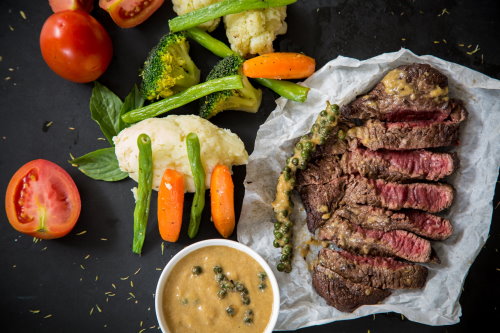When it comes to nutrition, we get mixed messages around two of the three macronutrients —fats and carbohydrates. We hear a lot about good fats vs. bad fats, and processed carbs vs. unprocessed carbs. But the third macronutrient, protein, seems as if it can do no wrong. Is protein all it’s made out to be?
BREAKING: 1 Cup of This Melts Belly and Arm Fat (Take Before Bed)
We connected with Elise Heeney, a registered dietitian at Health in Sun City, AZ, to learn more about why you need protein and some of the best ways to include protein in your diet. Here’s what she had to say.
Why do you need protein?
Protein helps your body grow and repair cells. It’s essential for building muscles, bones, organs and skin, as well as hair and nails.
What’s the relationship between protein and amino acids?
To understand why protein is so important, you need to know a little bit about amino acids. They are the building blocks of protein — your body breaks protein down into amino acids during digestion. You need them to function. Amino acids come in three different types:
- Essential amino acids, which need to come from food since your body can’t make them.
- Nonessential amino acids, which your body can produce.
- Conditional amino acids, which are normally nonessential amino acids but become essential in times of illness or stress, when your body’s needs exceed your ability to make them.
So, protein in your diet is important because that is where you get your essential amino acids. There are nine of them, and they work together, so you need to get all of them from the food you eat.
What are complete and incomplete proteins?
Complete proteins are proteins that contain all the essential amino acids. Foods that come from animals, such as dairy products, eggs, meats, poultry and seafood, have all the essential amino acids. For plant foods, soy, quinoa, amaranth, buckwheat, spirulina, and hemp and chia seeds are complete proteins.
Incomplete proteins, which are missing one or more essential amino acids, include beans, grains, nuts, seeds, peas and vegetables. But you can combine these foods, so you get complete proteins.
“When it comes to amino acids, having a balance over the course of a day is most important,” Heeney said. “You do not have to eat essential amino acids at every meal. Many incomplete proteins complement each other when they’re eaten together at the same meal or on the same day.” For example, when you eat rice and beans, or peanut butter on whole-grain bread, you get complete proteins.
What foods should I be eating to get the protein I need?
“Most Americans get enough protein from their diet, but not all proteins are created equal,” Heeney said. “It is important to consider how certain protein-rich foods may influence our health and to stress quality over quantity. Eating more lean proteins and plant-based proteins can improve your overall diet quality and health.”
She recommends choosing foods from a variety of animal and plant-based protein sources to help achieve a healthy, nutrient-dense eating pattern. Reach for:
- Low-fat dairy
- Skinless poultry
- Eggs
- Fish
- Beans
- Lentils
- Soy foods
- Whole grains
- Nuts and seeds
Heeney said to choose more unprocessed or minimally processed protein sources rather than processed or fortified foods: “Whole foods contain essential vitamins, minerals, fiber, and other naturally occurring components that can support good health. Processed foods may have some beneficial nutrients removed during processing.”
Some animal proteins are high in saturated fat and could increase your risk for heart disease if you eat them in high amounts. Research also shows that processed meats such as bacon, hot dogs, deli meat and sausage may increase your risk for colorectal cancers.
Plant-based sources of protein are good options. But to get the amount of protein you need exclusively from plants, you must eat a variety of protein foods throughout the day, so you get all the amino acids you need.
How much protein do you need?
Protein isn’t one-size-fits-all. People need different amounts of protein based on age, sex, activity level and health conditions. You’ll need more protein than average if you are pregnant or breastfeeding, highly active or have certain diseases. You can use the U.S. Department of Agriculture’s online calculator to figure out how much protein you need. You should aim for the calories you get from protein to be 10 to 35% of your total calories.
TRENDING: Diabetes Breakthrough Leaves Doctors Speechless - Try This Tonight
The bottom line
Protein and the amino acids it contains are crucial for good health. Your body uses protein to build and repair muscles, bones, organs, and skin. Lean animal foods and plant foods should make up the bulk of the sources of protein in your diet.









